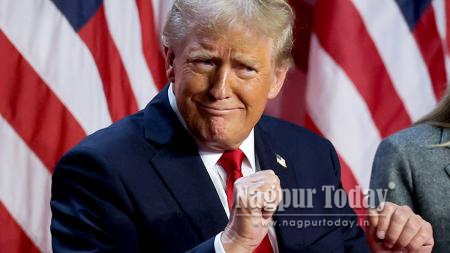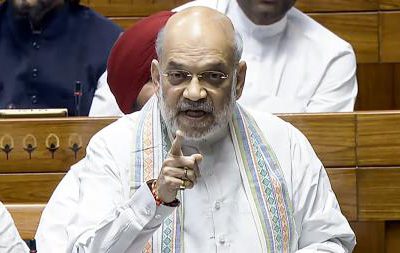
US President Donald Trump on Wednesday imposed 26% reciprocal tariffs on India, and unveiled a slew of tariffs on other nations including China, South Korea, EU and Taiwan.
Declaring that “our country has been looted, pillaged, raped, plundered” by foreign nations, Trump displayed a chart during his speech, and imposed 26% “reciprocal tariffs” on India, followed by 34% on China, 20% on EU, 25% on South Korea, 32% on Taiwan and 24% on Japan.
“For over 50 years, taxpayers have been cheated,” Trump stated at the White House. “That ends now.” He has pledged that these tariffs will bring factory jobs back to America, though economists warn the policy could trigger an abrupt economic downturn, with steep price increases on items like cars, clothing, and other essentials.
These tariffs build on recent moves, including a 25% tax on auto imports, levies targeting China, Canada, and Mexico, and broader penalties on steel and aluminum. Trump has also slapped tariffs on nations importing Venezuelan oil and plans additional taxes on pharmaceuticals, lumber, copper, and computer chips. Despite signals of a weakening stock market and souring consumer confidence, the administration shows no signs of rethinking its approach.
White House trade adviser Peter Navarro estimated the tariffs could generate $600 billion annually, marking the largest tax hike since World War II. Treasury Secretary Scott Bessent assured lawmakers the tariffs would be limited and open to negotiation, per Rep. Kevin Hern’s (R-Okla.) office. However, Yale’s Budget Lab predicts a 20% universal tariff would add $3,400 to $4,200 to the average household’s expenses, as importers pass costs to consumers.
The administration argues manufacturers will swiftly boost U.S. production and jobs. Yet, analyses of a potential 20% tariff suggest higher prices and economic stagnation, shaving about one percentage point off GDP growth. Everyday costs—clothing, oil, cars, housing, groceries, even insurance—would rise, per the Budget Lab.
Trump can impose these tariffs unilaterally, bypassing Congress, leaving Democrats to decry the move as reckless if business uncertainty and consumer pessimism signal trouble ahead. Heather Boushey, formerly of Biden’s Council of Economic Advisers, pointed out that Trump’s milder first-term tariffs failed to spark the promised manufacturing surge. “There’s no sign of the boom he touted,” she said. “It’s a flawed plan.”
Rep. Suzan DelBene (D-Wash.), chair of the Democratic Congressional Campaign Committee, called the tariffs “chaos and dysfunction” from Trump’s team, arguing he shouldn’t wield unchecked power to raise taxes. “This is a huge burden on families, enacted without a congressional vote,” she said. “Trump promised lower costs on day one—now he shrugs off price hikes, breaking that vow.”
Some Republicans, while supportive of Trump’s vision, admit the tariffs could jolt an economy with a solid 4.1% unemployment rate. “It might be bumpy at first,” said House Speaker Mike Johnson (R-La.). “But I believe it’ll benefit Americans in the end.”
Trading partners are gearing up for retaliation. Canada has countered Trump’s 25% tariffs—linked to fentanyl trafficking—with its own measures. The EU, responding to steel and aluminum duties, taxed €26 billion ($28 billion) in U.S. goods, including bourbon, prompting Trump to threaten a 200% tariff on European alcohol. Allies feel dragged into a fight they didn’t start, with Trump claiming both friends and rivals have exploited the U.S. through trade barriers.
Still, American incomes support purchases of French designer wear and German cars, while World Bank data show lower per-capita income in the EU. “Europe didn’t ignite this clash,” said European Commission President Ursula von der Leyen. “We’d rather not retaliate, but we’re ready with a robust plan if forced.” Italy’s Giorgia Meloni echoed calls to avoid a trade war, warning of “heavy” economic fallout.
Trump’s vague tariff hype has sown global uncertainty, hinting at a slowdown that could ripple beyond the U.S. Ray Sparnaay, a Canadian tool-and-die manager near Detroit, said the ambiguity has paralyzed his business. “We know tariffs are coming, but the details? Unknown,” he said Monday. “Since November, uncertainty has stalled our quotes and deals
















